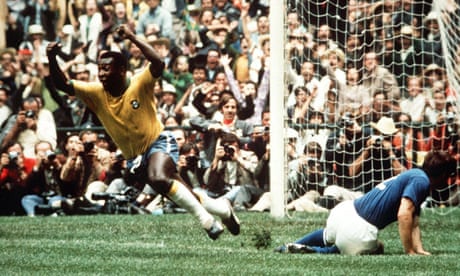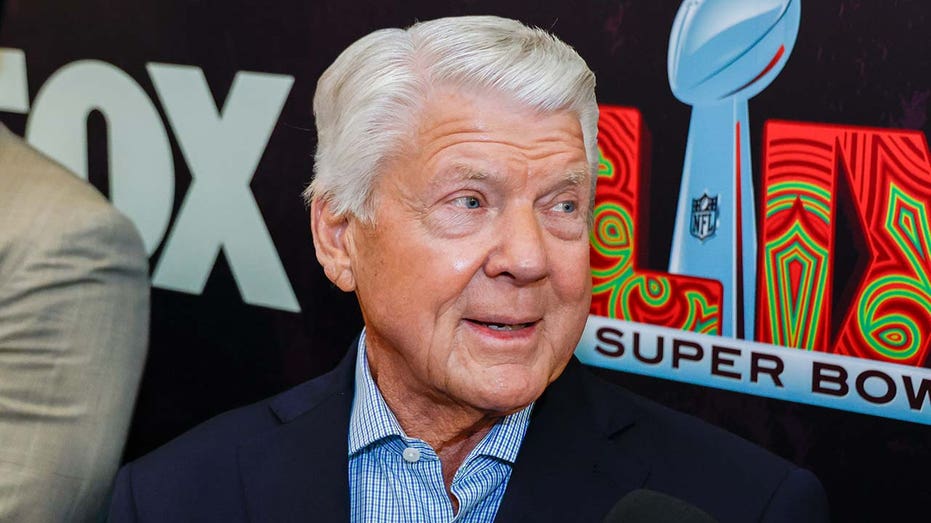- by foxnews
- 04 Mar 2025
Pelé radiated the quality of joy: an instant appeal to the eye and heart | Richard Williams
Pelé radiated the quality of joy: an instant appeal to the eye and heart | Richard Williams
- by theguardian
- 30 Dec 2022
- in news

The skinny 17-year-old with the flat-top haircut scored six goals, several of them executed with an impudent wit and a hitherto unimaginable level of technique, and then wept openly on the shoulder of Gilmar, the team's goalkeeper, when the triumph was secured. For many of his new fans in foreign lands, Edson Arantes do Nascimento was the first complicated foreign name they committed to memory.
He was the first global football superstar. More than that, along with Muhammad Ali and Bob Marley he became one of a select group of black sportsmen and entertainers who transcended their field of expertise and achieved global renown in the 20th century, with a status only half a rung below Martin Luther King and Nelson Mandela. Although he was accused in the 1970s of leftist sympathies by Brazil's repressive military government, he was no revolutionary; in general his public utterances were as benevolently anodyne as those of a Miss World contestant campaigning for world peace. But the effect of his presence, of his pre-eminence, helped loosen the shackles of ignorant prejudice.
No serious scandal stained his image during the 20 years of his playing career. He was not, of course, a perfect human being and he was certainly no softie on the pitch. But he did nothing mean or petty. His tricks with the ball bamboozled opponents but were never designed to diminish or humiliate them. He sought no unfair or illegitimate advantage. In victory he was gracious and modest, as if always profoundly aware of the good fortune that had been bestowed upon him. And he gave the impression of wanting to share his pride and pleasure in it with everyone.
It was there in the first of his goals that made his new international audience sit up and take notice, when he scored the third of Brazil's five goals in the 1958 final by calling for a pass from Nilton Santos and controlling the ball on his chest, waiting for it to drop and using his thigh to flip it over the head of Julle Gustavsson, the Swedish defender, before running round him and volleying the ball past the goalkeeper.
Here was a signature move, the equivalent of Puskas's drag-back, the Cruyff turn or Maradona's gambeta. And it was being accomplished by a teenager, his mind clear of calculation, barely older than the boys who then tried to emulate it in their school playgrounds. It was, he wrote in his autobiography, one of his all-time favourite goals - and, according to his Brazilian club, Santos, he had 1,091 to choose from - "because I was so young but also because no one had seen a goal like that before".
In fact the quarter-final against Wales had featured a more earthbound version of the same trick, when he controlled a short pass on his chest inside the penalty area, turned past the bewildered Mel Charles, the Welsh No 5, and nudged the ball past goalkeeper Jack Kelsey to produce the only goal of the match. Five days later the second-half hat-trick with which he led Brazil past France and into the final contained nothing as memorable: he was saving that up for the main event, which he sealed with a looping header that sailed inside the post in the 90th minute. He promptly fainted from the excitement, waking to find Garrincha holding his legs in the air to allow the blood to flow back to his brain.
He had worn the No 10 shirt for the first time during the tournament, doing more than anyone to give that magic number its lustre and its association with creativity of the most exalted kind. Many years later it was claimed that the Brazilian team management had submitted their list of players without designating individual numbers; apparently they had been allocated by a Fifa functionary.
In the era before substitutions, he remained on the field, a limping passenger of no functional value. Later he would credit the Czechs, and Jan Lala and Jan Popluhar in particular, for refusing to take advantage by inflicting further punishment. Knowing that he was unable to do them real damage, they gave him room whenever he had the ball. "It was one of the finest things that would happen in my football career," he wrote.
With Santos he continued to roam the world, refilling the club's coffers while allowing hundreds of thousands to glimpse his brilliance at first-hand. Finally, at the end of the 1974 season, he called it a day. At 34, his career in first-class football was over. But one new and unexpected challenge remained.
The following season he signed for the New York Cosmos, bankrolled by Warner Brothers, to compete in the North American Soccer League. The US had been the one place in the world he could walk the streets without being mobbed. That would change as, joined in this new adventure by Franz Beckenbauer, he briefly made attendance at a Cosmos game as fashionable as a visit to Studio 54. He was paid $7m, more than he had earned in his entire career with Santos, in a contract negotiated with the record company executives who had founded the club, and who included a recording contract as part of the deal, alongside various tax-minimising measures.
Now we can look at the images from those years, at the groovy Cosmos badge and the modest semi-afro and sideburns, and immediately hear the disco-funk soundtrack: Lady Marmalade, The Hustle, Jive Talkin', You Sexy Thing, Love Hangover, Shake Your Booty, That's the Way (I Like It). Maybe the football produced by the Cosmos at their successive homes - Downing Stadium on Randall's Island (where the pitch had to be sprayed with green paint to disguise the absence of grass), Yankee Stadium in the Bronx or the Giants Stadium in East Rutherford, New Jersey - had no more substance than the music but it similarly promised and often attained a good time, including the 1977 NASL championship. His retirement at the end of that season, celebrated with a match between his two clubs, in which he scored for both sides, prefaced the collapse of the league's fragile popularity.
Away from the pitch, his romantic life was a complicated matter of three marriages, half a dozen children and the odd paternity claim. His business ventures, too, often ended unhappily, largely thanks to a poor choice of associates. But his life remained eventful and fulfilling, whether he was starring in Escape to Victory or visiting Buckingham Palace to receive an honour.
In 1994, having rebuffed approaches from previous Brazilian presidents, he accepted a request from Fernando Henrique Cardoso to become the country's minister for sport. He campaigned for clubs to be run in a more ethical and transparent way, for players in Brazil to enjoy a Bosman-style freedom of movement, and for the separation of the league and the CBF, as had happened in England with the creation of the Premier League. He met less resistance when he instituted a programme of "Olympic villages" in cities around Brazil, intended to give the kids of the shantytowns a chance to play organised sport. "I did not realise that being in politics is one battle after another," he reflected and in 1998 he stepped down in order to be able to commentate on the World Cup in France.
As a spokesman for a credit card company, he continued to give interviews and press conferences in which he sometimes seemed too eager to say things that would please his audience. Speaking to the English press, for example, he would invariably single out an England player for favourable comment. Sometimes his judgments bemused his audience, as when, while addressing a meeting of the international football press, he lavished praise on Nicky Butt as the best player at the 2002 World Cup.
But he retained his aura. Like Stirling Moss or Arnold Palmer, he turned the business of being himself into his life's work, while never making the task seem onerous. For all that he had been through, all the hurtful injuries and the business humiliations, no lasting shadow fell on an ability to embody and project the essence of the simple game to which he had given new beauty and meaning. And, most of all, the joy that will continue to radiate whenever his name is spoken.
- by foxnews
- descember 09, 2016
Bus travel sees 'steady growth' as flyers seek alternative transportation
People who ride on airplanes might rely on alternative transportation for a number of reasons. A CEO of a bus travel company shares insights with Fox News Digital.
read more


